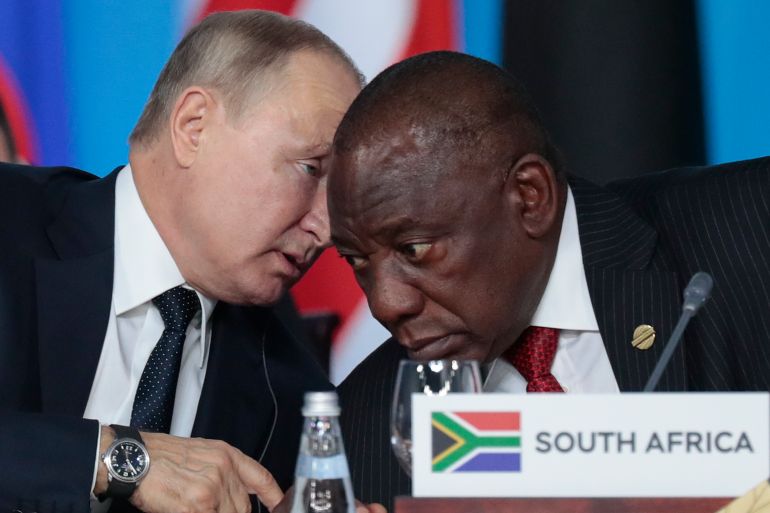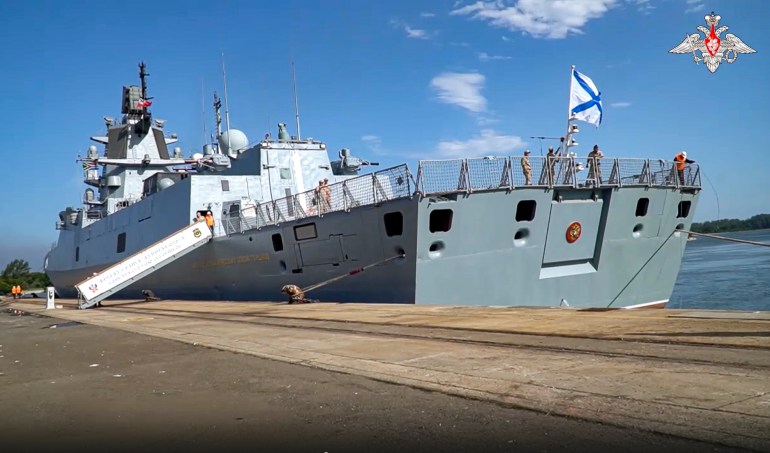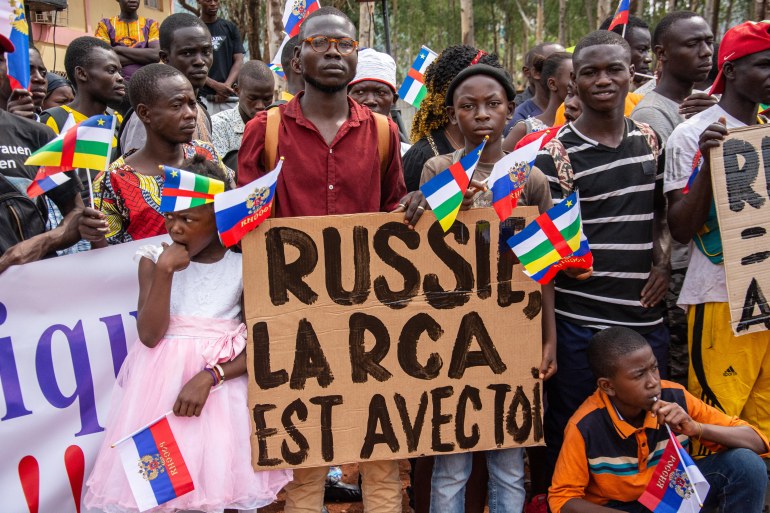Is Africa still ‘neutral’ a year into the Ukraine war?
Since Russia’s invasion, many African governments have officially not taken sides. But that may now be changing, even if the war’s impact on food security has not.

Harare, Zimbabwe – An imposing Russian warship armed with a powerful Zircon hypersonic missile, a handful of Chinese naval destroyers, and a host of frigates and supply vessels docked on South Africa’s coastal shores last Saturday.
The coterie of Russian and Chinese maritime firepower, which could easily bring a poorly equipped African nation’s navy to its knees militarily, would be spending days on parade in planned tri-nation naval drills off the coast of Durban in the country’s east.
Keep reading
list of 4 itemsIs China growing tired of Russia’s war in Ukraine?
More than 50,000 Russians killed in Ukrainian ‘meat grinder’: Report
Ukraine says 17 killed in Russian missile attack on Chernihiv
A year ago, it would have been hard to imagine South Africa – which has adopted a publicly “neutral” stance on the war in Ukraine – opting to host such an event with Russia while the latter invaded its neighbour.
“[The position of ] neutrality can cost,” South African President Cyril Ramaphosa said in an interview with Bloomberg last March. “And fortunately, we’re not alone in all this, there are many others that have chosen the same path. The benefit in all this is that we can talk to both sides.”
The old guard of African politics shared the same sentiments.
“We don’t believe in being enemies of somebody’s enemy,” Ugandan President Yoweri Museveni, who has ruled since 1986, said in July last year after hosting Russian foreign minister Sergey Lavrov when he toured African nations to rally support for the war in Ukraine.
At a continental level, it was a similar tune.
Of the 35 countries that abstained from voting in a crucial United Nations General Assembly (UNGA) resolution last March condemning Russia’s invasion of Ukraine, 17 were African.
“We do not want to be aligned on this conflict, very clearly, we want peace,” Senegal’s President Macky Sall, the then-chairperson of the African Union (AU) said.
‘Partisan’
Fast forward to a year later and with no end to the war in sight, it seems many African nations are holding their neutral position.
During a UNGA vote last week demanding that Moscow withdraw its troops from Ukraine and end the fighting, 32 countries abstained – 15 of them African.
South Africa, which is holding its joint naval drills with Russia in the same week as the anniversary of the war, was among the abstentions.
Piers Pigou, the International Crisis Group’s senior consultant for Southern Africa, said the continent’s stance on neutrality has not shifted.
“The problem, of course, is the optics of [South Africa’s naval engagements at] this time. It’s astonishing that they wouldn’t have known sometime in advance that the timing of this thing would be awkward. But they don’t seem to care too much about that,” Pigou told Al Jazeera.
“It means they are doubling down on a position they say is non-aligned but certainly gives the impression to many people that they are partisan.”

And optics are proving to be everything.
“The United States has concerns about any country … exercising with Russia as Russia wages a brutal war against Ukraine,” Karine Jean-Pierre, the White House press secretary said last month when responding to queries on South Africa’s naval drills with Russia.
This came at the same time that the US plans to introduce a bill that would compel Washington to punish African countries who aid and abet what it sees as Russian “malign” activities on the continent.
Called the Countering Malign Russian Activities in Africa Act, which is expected to become law soon, it seeks to counter what the US considers to be Russia and its proxies’ hostile influence on the continent.
The legislation “is causing a bit of controversy with the potential to punish countries trading with Russia”, Pigou said, adding that it is “the big pebble in the shoe at the moment”.
Diplomatic charm
However, on the African continent, where Washington struggles diplomatically, Russia appears to be succeeding.
Foreign minister Lavrov, who last year met leaders of Angola, Botswana, Eswatini, Eritrea, South Africa, Egypt, the Republic of Congo, Uganda and Ethiopia on a series of trips to the continent, has been able to charm diplomatically.
Of the four states he first visited in July, three – Congo, Ethiopia and Uganda – chose to abstain at the UNGA meeting in October when asked to vote to condemn Russia’s attempts to annex Ukrainian regions.
Outside of the Ukraine conflict, Russia has also been making massive in-roads in other parts of Africa, including Sudan, Central African Republic, and Mali where the Wagner group, a mercenary organisation linked to Moscow, is involved in the fighting while some Western military forces, such as the French army in the Sahel, have made the decision to leave.
Other African countries have fostered links with key Russian allies. Zimbabwe, for instance – which has had frosty relations with the West since Robert Mugabe’s policies of land seizure and redistribution to the Black majority were put in place – played host last month to Russia’s biggest ally, Belarusian President Aleksandr Lukanhesko.
Riding on history
Russia has historical ties with the continent dating back to the Soviet Union, which supported many pro-independence movements in Africa at a time of Western political dominance.
During apartheid in South Africa, the Soviets offered funding and paramilitary training to the liberation movement that became the governing African National Congress (ANC) after democracy in 1994. In Zimbabwe, it supported the African National Union-Patriotic Front (ZANU-PF) when the party fought a settler Rhodesian government from the 1960s until independence in 1980. And in Angola, it provided military support to the Movimento Popular de Libertacao de Angola (MPLA), from the 1960s until independence from Portugal in 1975 at the height of the Cold War.
“Loyalty to Russia based on its support, as the Soviet Union, during the struggle for independence has been strong,” Stephen Chan, a professor of world politics at the University of London’s School of Oriental and African Studies (SOAS), noted to Al Jazeera. “Thus the posture of neutrality – [is] in a way wanting to have it both ways.”
When it comes to Ukraine, Chan said African states must pick sides instead of being seen to be supporting Russia while also being cosy with its foes.
Three superpowers
The Ukraine war has exposed African nations’ failure to diplomatically navigate their way through an unfamiliar political order, Chan argued.
“This has certainly engendered a three-way struggle for influence in Africa – with the West only now taking seriously the challenges posed by both Russia and China,” he told Al Jazeera.
In both the bipolar political order – a period dominated by Russia and the US – and the unipolar political order that followed the collapse of the Soviet Union, making the US the sole superpower, the choice was simple – either Russia or the US. Now, however, it is a choice between three powers: the US, Russia and China.
“Africa will find it increasingly difficult to map a balanced path that weaves successfully between three superpowers,” Chan said.
It’s a view echoed by Ronald Chipaike, a lecturer in peace and governance at the Bindura University in Zimbabwe.
“Africa hasn’t benefitted much from its neutrality in the conflict, just as it didn’t benefit much during the Cold War,” he said, adding the continent will only reap “fringe” benefits such as saving Africa from “direct confrontation with either the West or Russia”.
Although the AU purports to be neutral, when Ukraine’s President Volodymyr Zelenskyy made diplomatic overtures last April for a video conference with African leaders via the AU, to rally them to Ukraine’s side, the request was pushed back several times, and only happened in June – 10 weeks after his first request.
Even then, only four heads of state attended while the rest sent emissaries.
“This shows that African countries seem to have a soft spot for Russia and it puts the whole neutrality issue into question,” Chipaike told Al Jazeera.

Food security concerns
Amid changing political and diplomatic posturing by leaders, on the ground, the supply chains long disrupted by the war are still yet to normalise. Africa is bearing the brunt of food shortages and inflation given its heavy reliance on imports.
African countries, which import 50 percent of their wheat from Russia and Ukraine, saw prices jump 71 percent last March.
Although the food situation has somewhat improved as more grains leave Black Sea ports and reach African countries, things are far from back to normal on the continent.
Now, prices are much higher, eroding purchasing power for many Africans.
Of the 24 countries that desperately need food aid that the Food and Agriculture Organization (FAO) and World Food Programme (WFP) have identified as hunger hotspots, 16 are in Africa, due to global supply constraints, the war in Ukraine, COVID-19 and climate change.
Additionally, a poor rice season last year will affect Africa, a joint statement of FAO, WFP and the International Monetary Fund in early February said.
Before the war, about 283 million people were already “suffering from hunger” in Africa, according to the African Development Bank.
Africans on the front line
Apart from food, Africa has also had to deal with the racial undertones of the conflict.
When the war broke out, African students in Ukraine reported numerous episodes of racial abuse and discrimination at the borders as they attempted to cross towards safety into neighbouring countries alongside European refugees who were generally welcomed with open arms.
On the other side of the battle lines, the situation for Black Africans is precarious in different ways.
Last year, a Zambian student was killed in Ukraine while fighting for Russia.
The student, Lemekhani Nyirenda, who had no military background, was deployed to the front lines by the Russian mercenary group, Wagner. It remains unclear how Nyirenda, who was serving a nine-year sentence in a Russian prison for a drug offence, ended up in Ukraine; however, Russian authorities said he had been pardoned before joining the war.
Another Tanzanian student, Nemes Tarimo, also died in Ukraine after being recruited from a Russian prison where he was serving a seven-year sentence for a drug offence.
At the latest UNGA vote on Thursday – the anniversary of Russia’s invasion of Ukraine – Zambia joined 140 other countries in supporting the resolution calling for the war to end, while Tanzania failed to register a vote.
At the same time in South Africa, which has continued to abstain from UN votes on the war due to its commitment to neutrality, the naval drills with Russia pressed ahead as planned, despite Western pressure and criticisms about the insensitivity of the timing.
“There is a difference between military and politics,” Lieutenant-General Siphiwe Sangweni, the chief of joint operations in the South African National Defence Force, told journalists on Wednesday, defending the decision to hold the drills.
“Yes, there will be other countries who feel differently in how we have approached this, but … all countries are sovereign nations and have a right to handle things [as] they see fit,” he said.